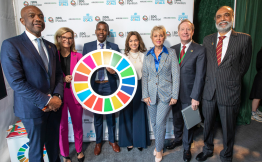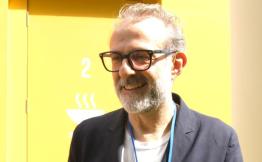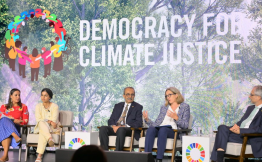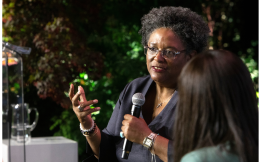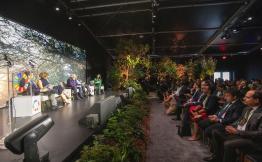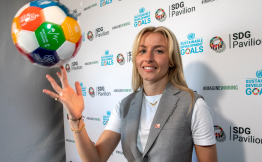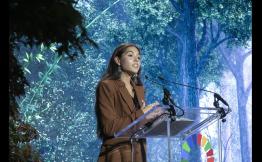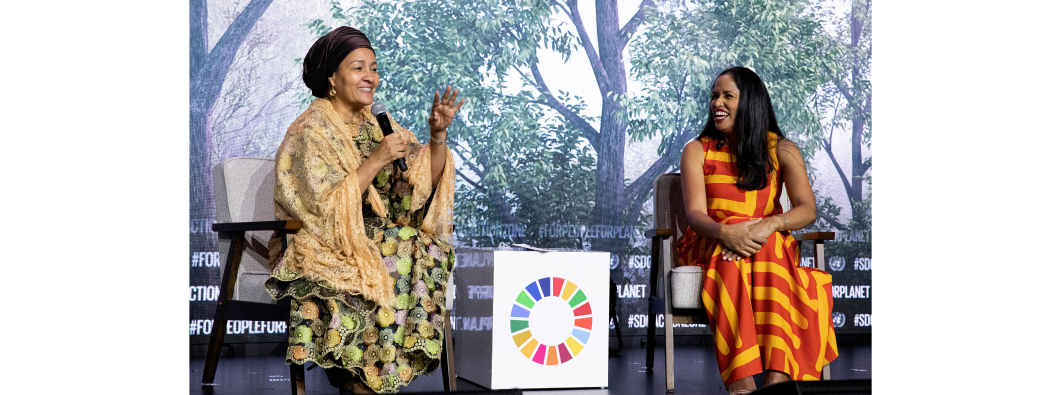
SDG Action Zone holds feet to the fire with accountability focus
The fifth edition of the SDG Action Zone took place in the SDG Pavilion on Thursday morning, providing a meaningful platform for a diverse range of actors to share perspectives, spotlight solutions, exchange ideas, and discuss lessons learned.
The SDG Action Zone 2023 opened up the UN General Assembly (UNGA) to SDG champions, activists, and allies to feature critical insights for people and planet: from thought leaders to social movers, changemakers and the highest levels of UN leadership.
In a spoken word performance, award-winning poet and writer Ramya Ramana reflected on opportunities, humility, and hubris. “And this landscape is worthy of beauty: Expansions of lily pads freckling horizons of water. Asir magpies painted with a single blue-ish stripe, their ability to mimic human sound – what a weight of voice. It is evident after all, grass longs to be full and green. And earth cries to be clothed well: education, opportunity, health, economic justice, peace, sustainable lands for all.”
Accountability + Action for People + Planet
The first panel of the session tackled head-on this year’s theme: “Raising Accountability.” In a world shaken by the forces of climate change – fierce heat waves, flash floods, severe droughts, and raging wildfires – the need for action has never been more urgent. Activists and political leaders joined this session, diving into the heart of the matter and one of the most effective climate solutions: accountability.
Catherine McKenna, CEO of Climate and Nature Solutions and former Minister of Environment and Climate Change of Canada, noted that young people want to work for businesses and companies that are actively doing the right thing in terms of climate action, and people want to invest their money with banks and companies that are not harming the planet.
Paloma Costa, Youth Climate Advisor and Co-founder of the Youth Climate Justice Fund, agreed that accountability is an issue for all of us. “We are out of time. If we want to be accountable, we need to have access to information, to education, and to spaces for deliberative decisions.”
Amitabh Behar, Executive Director ad interim at Oxfam International, decried the “empty rhetoric” and “greenwashing” from the private sector, and the failure of global political leadership. “It is going to be the people's power which is going to hold them accountable to these promises.”
Trailblazing in business
In September 2022, Patagonia’s CEO and Founder Yvon Chouinard “gave away his business,” donating all future profits to help fight climate change. In a fireside chat, Greg Curtis, Executive Director of Holdfast Collective (Patagonia’s new non-profit shareholder) explained the motivations behind the move to redirect Patagonia’s profits towards environmental preservation, and how this shift reflects a wider web of businesses taking responsibility for their impact on people and planet. “I'm hoping to create an environment where we can support local grassroots organizations to protect something that's important to them in their local community,” he said.
How to boost global SDG movements?
No matter the crisis – be it climate change, inequality, or human rights violations – social movements have consistently drawn attention to societal grievances and advocated for needed change. The panel on boosting these movements brought together voices from different movements to discuss the impact and indicators of successful movements, identify universal learnings, and explore strategies to boost powerful movements for the SDGs.
Climate Justice Warrior Selina N. Leem opened this session with a firsthand account of the current situation on the ground, addressing clear words to developed nations: “Your comfort is enabled by the erasure of our cultures, languages, livelihoods, and security.” Leaving participants with a strong message, she closed her appeal with “1.5 to stay alive.”
Hahrie Han, Professor of Political Science at Johns Hopkins University, said that every major change in human history has been driven by social movements, often with young people at the forefront. “Systems are so entrenched that it often takes disruption – and people power to be able to do that. There's a gap between the world as it is and the world as it should be, and people have to close that.”
Activism isn’t a choice, but a compulsion, according to Eddie Ndopu, UN Secretary-General's SDG Advocate, adding that activism is the work of the imagination, because it's about envisioning a world that doesn't yet exist.
Shruti Suresh, Co-Director of Campaigns ad interim at Global Witness, said that the checks and balances on unchecked power are being fundamentally eroded. Global Witness, she added, speaks truth to power, using investigations to expose hidden power dynamics, particularly where corporations are working with authoritarian governments.
Arts + Culture for People + Planet
Having analyzed accountability, the possibilities and responsibilities of business, and the power of and need for social movements, the SDG Action Zone shifted focus to touching people’s minds and hearts through a panel of artists moderated by Brady Walkinshaw, CEO of Earth Alliance.
Artist and Buddhist Monk, Kodo Nishimura discussed the importance of representation, and what it meant to see art, music, and movies featuring LGBTQIA+ people. “Their struggles were identical to mine. And that made me feel that I was not alone.”
“We’re storytelling animals,” said Es Devlin, the stage designer and artist behind the SDG Pavilion. “We think we're living inside places, but we're really living inside stories. Between all of us, there's only connectivity. There's only the continuation between us, plants, other species, and each other."
Omoyemi Akerele, Founder and CEO of Style House Files and Lagos Fashion Week, said that fashion is an important tool for shaping conversations around climate change, consumption patterns, and habits. “Every contribution is important to creating the clothes that we see. Fashion is about heritage and speaks to a culture of craftsmanship. Africa was always the continent that was associated with pessimism. But, in the last decade, we've started to see the stories come out of Africa, with our music, with movies, and with fashion.”
Sharing the stage was renowned singer Baaba Maal, who spoke of the need (and possibility) to inspire people all over the world. “Everyone can have a dream and can make it happen,” he assured before calling for global unity: “We are one big country, we are one big family, and we have one big responsibility to share something and to give it to the next generations.”
How do we know what’s working?
How can we measure the success of a society? Gross Domestic Product (GDP) does not guarantee equal benefits for all in society so, to make a positive difference, policymakers must adopt real-life indicators that truly reflect the well-being of people and planet. The “How do we know what’s working?” panel addressed what these crucial success metrics could be and how to shift systems and mindsets to address them.
“When it comes to assessing what works and what doesn’t work, we need to listen to ourselves and not to those who will always tell us that we will fail,” said Luisa Neubauer, a leading member of Fridays for Future in Germany. “It is on us to make sure that people are not falling for the lies and the dark stories of the cynics.”
H.E. Yolanda Awel Deng Juach, Minister of Health of the Republic of South Sudan, said that the mortality rate is a clear metric for success or failure. “This year, eight million people are on the verge of starvation and hunger in my country, almost half the population. So, that tells me that something is not working.”
Nahla Valji, Global Coordinator for the UN Spotlight Initiative, pointed to women's equal participation in society as a key metric for progress, because it helps achieve all the SDGs.
Anna Bjerde, Managing Director of Operations at the World Bank, declared that the organization’s goal is to eliminate poverty on a livable planet, so the metrics that lead to that goal need to be tracked. “We must lift everyone up. This is about raising everyone's prosperity and it's about reducing inequality across countries.”
Overdue, but not too late
For the closing session, UN Deputy Secretary-General Amina J. Mohammed underscored the urgency for each of us to play our part in shaping a world where the SDGs are a lived reality.
“Leaders have been in the house [UN Headquarters] and they may not be Presidents and Prime Ministers but, I can tell you, they've been stepping up. The messages that we knew we wanted to take out of the General Assembly will go back to capitals, and those messages are not just going back with other delegations. They're going with stakeholders, civil society, women's groups, young people, business, academia, and scientists. I think this house has opened up more than it has in quite a while, but it has to be every house and every country, in our local communities. And it is happening more now than ever.”
Watch all sessions at sdgactionzone.org/on-demand/
See more photos [HERE]




